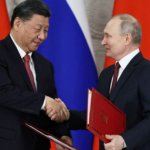
The U.S. and its allies can’t afford to drift aimlessly as history’s tectonic plates shift.
This article was first published in The Wall Street Journal on April 12, 2023. Click Here to read the original article.
The post-Cold War era is over. This brief interregnum following the Soviet empire’s defeat proved an illusory holiday from reality and is now rapidly disappearing before expanding or newly emerging threats. History often fails to arrange itself conveniently for our understanding, especially for those alive when its tectonic plates shift. By any standard, however, history is now moving rapidly.
Xi Jinping certainly thinks so. He told Vladimir Putin after their recent Moscow summit: “Right now there are changes—the likes of which we haven’t seen for 100 years—and we are the ones driving these changes together.” For China’s communists, that century started with the 1927 onset of civil war against Chiang Kai-shek’s Kuomintang, culminating victoriously in 1949 when Mao Zedong established the People’s Republic of China and famously declared that “the Chinese people have stood up!”
Mr. Putin similarly proclaimed that “an era of revolutionary changes” is under way globally, but not as exuberantly as Mr. Xi. Mr. Putin is clearly the junior partner as the Beijing-Moscow relationship shifts from “entente” to “axis.” Nonetheless, the Kremlin holds a strong strategic hand in nuclear weapons and energy. China’s nuclear weapons remain critically dependent on Russia for highly enriched uranium, and Moscow’s grip on Europe’s civil nuclear-power industry is firm.
America’s next president will take office in 2025, the 75th anniversary of NSC-68, Harry S. Truman’s foundational document of U.S. Cold War strategy. With less than two years before Inauguration Day, presidential candidates should be thinking in grand-strategy terms, for both campaign policy statements and their incipient administrations. Given the Sino-Russian axis and accompanying rogue-state outriders like Iran and North Korea, any serious contemporary reincarnation of NSC-68 will be as daunting and hard to swallow as the original.
To get the ball rolling, here are three critical elements for any plausible course of strategic thinking:
Continue reading on WSJ.com.